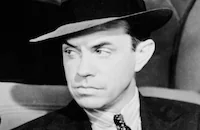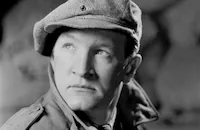Wildcat Bus

Brief Synopsis
Cast & Crew
Frank Woodruff
Fay Wray
Charles Lang
Paul Guilfoyle
Don Costello
Paul Mcgrath
Film Details
Technical Specs

Synopsis
After squandering his inheritance, playboy Jerry Waters loses all of his possessions except for his car. Accompanied by his chauffeur and friend, Donovan, Jerry applies for a job at the Federated Bus Line, where he is turned down when he irritates Ted Dawson, the boss's daughter. Plagued by an unexplained rash of accidents and breakdowns, the bus line is in danger of losing its franchise, and Ted believes that their recent misfortune is linked to the fact that her father has sent his partner, Talbot, to prison for embezzlement. After Ted refuses to hire Jerry, Joe Miller, Federated's general manager, refers him to Sid Casey, the manager of a wildcat taxi company that is in league with Miller to run the Dawsons out of business. Casey hires Jerry and his car, and orders him to rent a room nearby at Ma Talbot's boardinghouse. Ma, who is Talbot's wife, is the brains behind the operation and is plotting revenge for Dawson's imprisonment of her husband. Ted, suspicious of the taxi service, poses as a passenger, and during her investigation she meets Jerry and warns him about the wildcatters. Meanwhile, Donovan, who is now driving a bus for the Dawsons, is forced off the road by a car full of wildcatters. In the accident, passenger Davis is injured, thereby arousing Donovan's suspicion. When Donovan discovers that Davis is working for the wildcatters, he warns Jerry, who quits. To prevent Donovan from testifying in court, Davis and the others injure him in an accident, and when Jerry sees Davis driving away, he joins forces with Dawson and his crew to bring the wildcatters to justice. Dawson and the others follow Jerry to the boardinghouse, where Dawson learns that his tormentor is Talbot's wife. As Ma points a gun at Dawson, she falls down the stairs to her death and soon after, the police arrive to arrest the wildcatters. With Casey and the others under arrest, Federated Bus Lines resumes peaceful operations and Jerry and Ted decide to wed.

Director
Frank Woodruff
Cast

Fay Wray
Charles Lang

Paul Guilfoyle

Don Costello
Paul Mcgrath

Joseph Sawyer
Roland Drew
Leona Roberts
Oscar O'shea
Frank Shannon
Warren Ashe
Chester Cluge
Max Wagner
Don Zelaya
David Kerwin
Grace Hayle
Henry Roquemore
Henry Blair
Irene Charters
Norman Mayes
Ronnie Rondell
Bud Fine
Manart Kippen
Landers Stevens

Keye Luke
Martha Wentworth
Earle Dewey
Minerva Urecal
Ed Dearing
Ross Forrester
Donald Kerr
Buddy Mason
Bud Geary
George De Normand
Gil Perkins
Charles Regan
Mike Lally
Jack Gardner
Fred Rapport
Gohr Van Vleck
Bob Perry
Jane Patten
Crew
George Crone
Lucius Croxton
Kenneth Holmes
Lou Lusty
Jack Mackenzie
Frank Maher
Lee Marcus
Van Nest Polglase
Cliff Reid
Renie
Vernon L. Walker

Videos
Movie Clip


Film Details
Technical Specs

Articles
Wildcat Bus
Wildcat Bus was one of the 13 features, two of them from RKO, in which he had small roles in 1940. At that time he only received decent roles when he worked for Poverty Row studios like Republic and Monogram, and sometimes not even then. None of them were leads, though some of his earlier films -- like Hitler -- Beast of Berlin (1939), made at PRC -- were re-issued with his name above the title after he shot to stardom in This Gun for Hire (1942).
The only performer from this film still known to general audiences is Fay Wray, a major star in the late '20s and early '30s best known as the 1933 King Kong's leading lady. Here she stars as Ted, the masculine-named daughter of a man running a small bus company. After her father turns in a partner for embezzlement, the company is suddenly hit with a string of freak accidents and breakdowns, along with competition from an upstart limousine company working the same routes. It's not long before Wray puts two and two together and links the new organization to her own company's problems, all with the help of former millionaire Charles Lang, who first meets her when he applies to work for the bus line.
Wray had been a big star at Paramount (she was Gary Cooper's most frequent co-star), but had left the studio to pursue free-lance work. Despite strong assignments at first, like MGM's Viva Villa! (1934) and, of course, King Kong, her fortunes steadily dwindled as she was moved into supporting roles in major pictures and could only find leads in B movies. A stint making films in London didn't help, nor did her decision to pursue more stage work in order to improve her acting. She got good reviews, but she also lost what little career momentum she had left. When screenwriter Robert Riskin proposed marriage in 1942, it was easy for her to cut back on screen work to focus on married life and motherhood.
The role of the breezy playboy who develops a moral conscience once he gets involved in Wray's problems would have been a natural for Ladd, but he wasn't considered leading man material at the time. Instead, the role went to Charles Lang, who had been spotted by Paramount Pictures talent scouts while playing baseball for the Brooklyn Dodgers' farm team. He made his film debut on loan to RKO for One Crowded Night (1940), in which he plays a Naval deserter, then stayed at the studio for Wildcat Bus. Lang's acting career didn't really get far, but in 1950 he switched to writing. His first script, Killer Shark (1950), was directed by Budd Boetticher, who would become a longtime associate. For Boetticher, he wrote the bullfighting saga The Magnificent Matador (1955) and the Randolph Scott Westerns Decision at Sundown (1957) and Buchanan Rides Alone (1958).
Notable in the film's supporting cast are Paul Guilfoyle, who played Clarence "Pearly" Gates in RKO's series of mysteries featuring The Saint, perennial tough guy Don Costello, character actor Joe Sawyer, probably best known as the racetrack bartender in Stanley Kubrick's The Killing (1956), Leona Roberts, who played Doc Meade's wife in Gone With the Wind (1939), Number One Son Keye Luke, who went on to play Master Po in the original series Kung Fu and somewhere, if you can spot him, Ladd.
By Frank Miller
Producer: Lee Marcus, Cliff Reid
Director: Frank Woodruff
Screenplay: Lou Lusty
Cinematography: Jack MacKenzie
Score: Roy Webb
Cast: Fay Wray (Ted Dawson), Charles Lang (Jerry Waters), Paul Guilfoyle (Donovan), Don Costello (Sid Casey), Joe Sawyer (Burke), Leona Roberts (Emma "Ma" Talbot), Oscar O'Shea (Charles Dawson), Keye Luke (Tai), Alan Ladd (Bit)

Wildcat Bus
Quotes
Trivia
Notes
According to a news item in Hollywood Reporter, RKO bought the original story for this picture from Owen Francis, and Clarence Upson Young was to have written the screen adaptation, but their participation in the film has not been confirmed, as they are not credited onscreen, in the Screen Achievements Bulletin, or in reviews.














